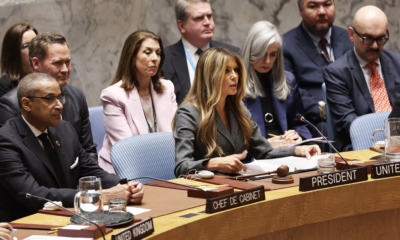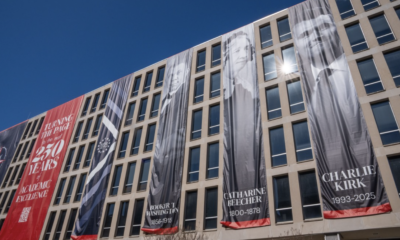Trump Presidency
White House Denies Ignoring Court Order on Venezuelan Deportations Amid Legal Battle
The White House under the Donald Trump administration is pushing back against accusations that it defied a federal court order halting the deportation of Venezuelan migrants, a move that has raised serious legal and constitutional questions about presidential power. The controversy centres around the use of the Alien Enemies Act, an 18th-century law, to justify the removal of alleged gang members to El Salvador.
A Court Order, A Presidential Power Play
On Saturday, U.S. District Judge James Boasberg issued an emergency ruling to temporarily block deportations to allow for legal review. The ruling explicitly stated that any aircraft already transporting migrants should return to U.S. soil. However, the Biden administration later announced that over 250 Venezuelan deportees—whom it identified as members of the Tren de Aragua gang—had already arrived in El Salvador and were in custody.
In a carefully worded response, White House Press Secretary Karoline Leavitt denied wrongdoing. “The Administration did not ‘refuse to comply’ with a court order. The order, which had no lawful basis, was issued after terrorist (Tren de Aragua) aliens had already been removed from U.S. territory,” Leavitt stated.
Her response raises critical questions about the timeline of the deportations and whether the Donald Trump administration deliberately acted before the court’s ruling could take effect.
Legal and Constitutional Implications
The case is already being called one of the Donald Trump administration’s biggest legal challenges. If it is determined that the White House ignored a judicial order, it could trigger a constitutional crisis, with potential implications for executive power and the separation of powers between the presidency and the judiciary.
The administration has argued that its actions were legal under the Alien Enemies Act, a 1798 law originally intended for wartime use. Critics, however, point out that the U.S. is not at war with Venezuela, making the law’s application questionable at best.
The Politics of Deportation
This move is part of a broader crackdown on immigration that has drawn both praise and outrage. Supporters of the administration claim that removing dangerous gang members is necessary to protect American communities. However, human rights organizations warn that sending migrants with Venezuelan deportations to El Salvador—where prison conditions are notoriously harsh—may violate international law, which prohibits deportations to countries where individuals could face persecution or inhumane treatment.
Additionally, some lawmakers, including Texas Democratic Rep. Jasmine Crockett, have criticized the White House for using sweeping executive power to sidestep legal due process.
“We have courts, we have processes, we have laws, and we should just go ahead and use those,” Crockett said.
A Broader Pattern of Executive Overreach?
This deportation controversy is not happening in isolation. The administration has also faced backlash over the arrest of Palestinian activist Mahmoud Khalil, a former Columbia University student whose green card was revoked. Critics argue that Khalil’s arrest was based on his political views rather than any proven criminal activity.
Moreover, Trump’s abrupt shutdown of Voice of America, the government-funded international news agency, has sparked fresh debates about executive authority over federally funded programs.
What Happens Next?
Legal experts predict that this case, like several others, will likely head to the Supreme Court, where the limits of presidential power will be tested. The big question remains: Did the Donald Trump Administration-run White House knowingly ignore a court order, or did it find a legal loophole to justify its actions with Venezuelan Deportations?
With both sides digging in, this legal battle could have lasting consequences for how far a president can bypass the judiciary to achieve policy goals.












































Pingback: Students NOT Getting Kicked Out of the US says Prodigy Finance
Pingback: Portugal Deportation of 18,000 Migrants Amid Snap Election